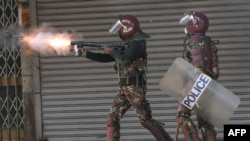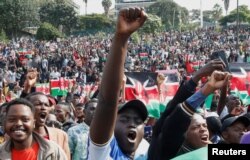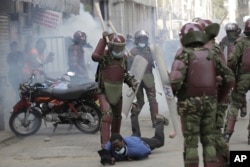On July 15, Kenyan President William Ruto accused the U.S. non-governmental organization, Ford Foundation, which provides grants to human rights, press freedom, and anti-corruption initiatives and groups in Kenya, of sponsoring the nationwide protests prompted by the taxation bill.
The bill would impose unaffordable tax rises on ordinary citizens and businesses already burdened by the high cost of living.
The demonstrations led by Generation Z Kenyans, a demographic cohort of educated unemployed youth, began on June 18.
Protesters stormed the parliament building and burnt some of its sections, forcing the members of parliament to flee.
Bowing to the pressure of Gen Z, the president withdrew the bill on June 26, and fired his entire cabinet except for the foreign minister on July 11. Yet the civil unrest continues spreading across the country.
Speaking on July 11 in the regional capital city of Kajiado near the border with Nairobi, Ruto promised Kenyans that they would have a chance to decide the future of their nation in 2027, the year of the next presidential elections in Kenya, and blamed "foreign powers” for “funding the protests," bringing “chaos” and “destroying peace” in the country.
“To those who are trying to do things from overseas … to organize things … I want to tell them that Kenya is a democratic nation, and this is our country and we are not moving out of Kenya.”
That is misleading.
Independent international agencies rank Kenya among the middle-range nations on the global democracy scale.
The German Democracy Matrix rates Kenya 82nd out of 176 nations and ranks it as a “hybrid regime,” giving it a 0.576 democracy score. For comparison, the Democracy Matrix gives the highest score of 0.958 to Denmark and the lowest of 0.017 to Eritrea.
The Sweden-based International IDEA’s Global State of Democracy Initiative says its annual ranks focus on specific areas of democratic performance rather than defining the types of regimes. Out of 174 countries, it ranks Kenya between 39 and 89 in four categories, including respect for human rights, and the rule of law.
The U.S.-based Freedom House rates Kenya as partly free, giving it a 52 out of 100 global score.
The rating agencies note that Kenya regularly holds elections and has a vibrant civil society and media. However, such persisting issues as “pervasive corruption and brutality by security forces,” as well as restrictive laws and intimidation against journalists and human rights defenders affect Kenya’s democracy ranking.
Reporters Without Borders (RSF) ranked Kenya among countries whose press freedom continued declining for the second year in a row.
The latest protests showed that democracy in Kenya is under pressure from the ruling political class. The government restricted the Kenyans’ freedom to exercise their constitutional rights, including the right to protest and freedom of expression.
On June 18, shortly after the Gen Z protest rally started, the government reportedly ordered the police to crush the demonstrations. The police fired, indiscriminately, live bullets at the crowd, and used tear gas and water cannons.
The law enforcement killed 41 and injured 361 others while an unknown number of protesters remains missing after the police allegedly abducted them, Le Mond reported.
Rights watchdogs report that extrajudicial killings and forced disappearances staged by the police are commonplace in Kenya.
In April 2023, an investigation by the Human Reports Watch and 15 other local and international human rights groups implicated the Kenyan police in 219 cases of killings and forced disappearances.
The U.S.-headquartered International Police Science Association’s World Internal Security and Police Index ranked the Kenyan police third-worst national police force globally.
Last July, the U.S. State Department raised the travel advisory for Kenya to Level 2 due to civil unrest, terrorism, kidnapping, and crime. This is a step away from advising American citizens not to travel to Kenya.
Transparency International ranks Kenya among the most corrupt countries globally.
In its latest corruption index, the TI ranked Kenya 126 out of 180 countries.
The U.S. Trade Office said in March that “American businesses are finding it hard to secure Kenyan government contracts” because “senior government officials seek a bribe before awarding such jobs.’’
“The contracts are going mainly to foreign firms willing to pay the bribes,” U.S. Trade Representative Ambassador Katherine Tai said.








